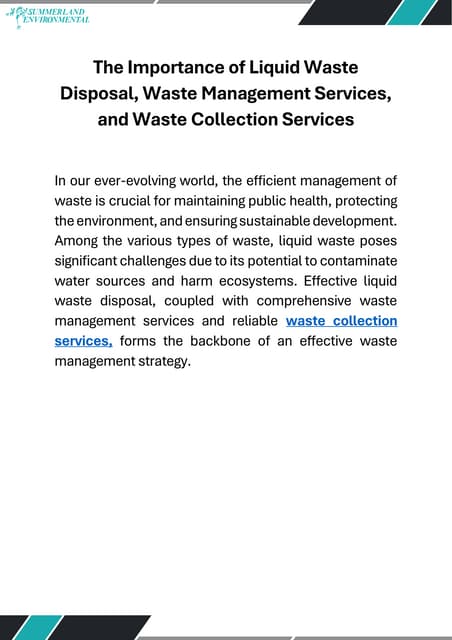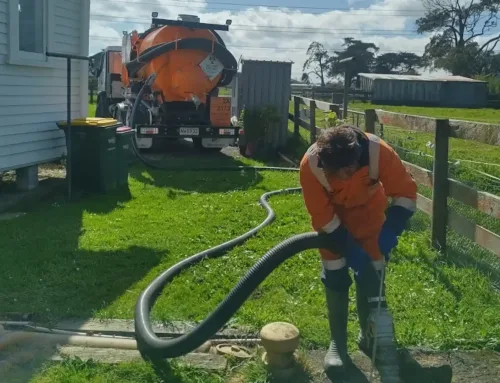Excitement About Reclaim Waste
Excitement About Reclaim Waste
Blog Article
Some Of Reclaim Waste
Table of ContentsReclaim Waste for BeginnersRumored Buzz on Reclaim WasteReclaim Waste Things To Know Before You BuyThe Ultimate Guide To Reclaim WasteThe Ultimate Guide To Reclaim WasteOur Reclaim Waste Diaries

Never ever put dangerous compounds down sinks, bathrooms or stormwater drains pipes Substances consisting of petroleum, grease, oil, pesticides and herbicides, and solvents such as paint strippers need to not be poured down sinks, bathrooms or stormwater drains. These materials are difficult to get rid of in the sewer treatment process and trigger contamination problems in our neighborhood rivers.

Fluid waste is a term that covers a broad range of products, there's a good factor why leaving its disposal to the professionals is recommended. Liquid waste is non-solid material that has no more use and needs to be dealt with and taken care of according to regional, state and federal regulations.
Reclaim Waste Things To Know Before You Get This
Examples of fluid waste can consist of wastewater, fats, oils or grease, utilized oil, fluids, solids, gases or sludges and dangerous house liquids, there are some that are considered to be extra harmful than others when it comes to the environment and the health and wellness of animals and humans alike. It's for this factor that each state and territory have strict guidelines linked to fluid waste management.
Liquid waste can be saved in holding tanks or packaged in drums, intermediate mass containers or authorized small containers prior to either being dealt with or removed using outsourced vacuum vehicles. Offered the nature of the products, liquid waste can not go in the general waste stream and there are stringent guidelines on how to dispose of it appropriately.
(https://www.blogtalkradio.com/reclaimwaste1)Relying on a decision of the level of danger, it might be essential to remediate those websites. Furthermore, hazardous fluid chemical wastes are controlled waste and should be tracked in conformity with the state waste legislation. Under the chain of safekeeping and duties, proprietors are responsible and responsible for waste generated by a company.
One of the core applications for superabsorbent polymers (SAPs) is fluid waste solidification. liquid waste removal melbourne. SAPs are utilized by waste administration professionals to avoid potentially dangerous liquids from entering waterways, groundwater aquifers, and various other delicate environments. Since fluids can quickly transport contaminants into environmental receptors and potentially contribute to geotechnical failures, fluid wastes are generally banned from disposal in landfills
The Main Principles Of Reclaim Waste
Primarily, complimentary liquids are liquids that divide from the solid part of waste material. Liquid waste can consist of the following: HDD mud and cuttings Land fill leachate Wastewater therapy sludge & biosolids Dredged debris Oil and gas drill cuttings Resolving fish pond muck Hydro Excavation slurry Coal combustion residuals/ash Storage tank base sludge Concrete grinding/polishing slurry Related Article: For a practical instance of cost-free fluids separating from waste material, take into consideration the adhering to circumstance: A waste administration contractor lots a dump associate sludge from a wastewater treatment plant's aeration basin, throughout a regular upkeep occasion.
Nevertheless, when the chauffeur gets to the garbage dump, he notifications water seeping from the sludge and putting from the dump vehicle. The lots was denied by the garbage dump and the chauffeur was required to dispose of the waste as a liquid waste at a special facility, which enhanced the disposal fees greatly.
We also need to be responsible for the appropriate disposal of our waste materials. It is not enough that we pay waste disposal companies to take treatment of our rubbish.
Some Known Details About Reclaim Waste

Segregating your waste can start inside the home. Segregate completely dry and liquid waste as well as edible waste, biodegradable and non-biodegradable materials.
Layer the base with soil to take in the wet waste. Layer the compost with damp and dry waste as well as dirt to keep a balance in between the wet and the completely dry.
Reclaim Waste Things To Know Before You Buy
To facilitate faster decomposition, you can also include semi composted soil to the garden compost. If you discover the odor is becoming also solid, include added papers and paper waste or add more holes to the garden compost bin visit the website to keep the balance of the waste products.
We likewise need to be liable for the correct disposal of our waste materials. It is not sufficient that we pay waste disposal firms to take treatment of our rubbish.
Our waste, our obligation. Have you ever questioned what occurs to your liquid waste after it's accumulated? Did you recognize that liquid waste can be reused? As responsible citizens, you ought to comprehend what occurs to your rubbish and where it goes after it is eliminated from you. Comprehending the liquid waste removal process is very important in aiding you to segregate your waste.
Reclaim Waste for Beginners
The suitable location is a good outdoor room with lots of sunshine and air. Segregate your waste. Segregating your waste can start inside the home. Segregate completely dry and liquid waste along with edible waste, biodegradable and non-biodegradable materials. Always maintain the cover on your containers to prevent insects, worms, flies, and unpleasant odours.
You can utilize old garbage container, bucket, yard pot or old plastic drums. Drill four to 5 openings in the container so the air can distribute. Layer all-time low with soil to soak up the wet waste. Beginning the composting procedure. Layer the compost with wet and completely dry waste as well as dirt to preserve a balance in between the damp and the dry.
Cover the compost bin. Once a week, add soil in addition to the compost. To help with faster decomposition, you can also include semi composted dirt to the compost. Preserve the garden compost. If you notice the smell is coming to be as well solid, add added newspapers and paper waste or add more holes to the garden compost bin to maintain the equilibrium of the waste products.
Report this page